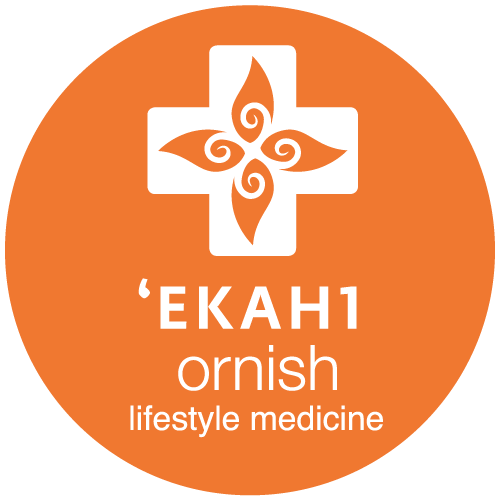By Robert Walker, Program Director at ‘Ekahi Ornish Lifestyle Medicine
Content adapted from Ornish Living Magazine, available online at www.ornishliving.com

For those of us who want to start leading a healthier life, New Year’s resolutions seem like the perfect jump-start. In fact, over half of all New Year’s resolutions involve a healthier diet, weight loss, and improved fitness. But health and fitness related resolutions are statistically the most likely resolutions to fail – with only a small handful achieving their goals. This is often especially disheartening for the many Americans who suffer from chronic conditions such as heart disease and diabetes. We want to live longer, healthier lives – so why do we fail?
Often we fail because we force change by setting into motion large and sweeping resolutions. Perhaps we’ll sign up for a gym with the belief that we’ll be there for hours each day – or we’ll start restrictive and unnecessary diets. When we strong-arm ourselves into big changes, we risk physical and emotional fatigue. Feeling defeated, we lose sight of our original goal and fall back into old patterns.
But years of research by Dr. Dean Ornish at the Preventative Medicine Institute in California showed that there’s a simpler, more compassionate way to wellness – even for those of us that suffer from chronic conditions exacerbated by our genetics and lifestyle. We are worthy of sustainable choices that contribute to healing our bodies, calming our minds, and revitalizing our relationships. Dr. Ornish outlined four “elements” that contribute to a healthier life: nutrition, stress management, moderate exercise, and love and support. Dedicating just a few minutes to each element per day can have a profound effect on our health.
Nutrition
Plant-based diets may seem intimidating at first, but it’s more about what you include rather than what you exclude. Variety is key, and delicious vegetarian options are more plentiful than ever.
Fitness
Moderate, regular exercise is key to achieving heart health. We might not all have time for an intense workout after we get home, but walking just 20 minutes each day – not necessarily consecutively – can lower your risk of heart disease by over 30%.
Stress Management
Yoga and Tai-Chi are well known forms of stress management, but the key is taking time to yourself! Finding a quiet place – whether it’s on the beach or in an empty room – and meditating for a few minutes each day can have a profound effect on your mood and emotional well-being.
Love and Support
When you communicate feelings from the heart, you begin to learn that vulnerability is not a liability. Negative emotions can damage the heart, but we can manage our emotions by maintaining strong relationships with our friends and family.
We are worthy of sustainable choices that contribute to healing our bodies, calming our minds, and revitalizing our relationships. As we welcome a New Year filled with this promise, it is the perfect time to step out of past choices of deprivation and into present choices, filled with compassion, abundance, and healing.

Well said, Robert! I agree that it starts with feeling worthy…of prioritizing our own health, to see our new year resolutions come to pass. Beside a new year, we have opportunities to do our best each new day. That’s exciting to me, too! Let’s be our best in 2019!
Thank you Kathy! It is amazing to watch our participants gain confidence as they understand how to regain control of their health in a supporting, safe environment. Learning how to make better decisions and taking life day-by-day help us achieve those small wins everyday that build up to doing our best all year long. And cheers to being our best in 2019!
I’m glad the article was helpful to you, Pierre! Even after re-reading it a year later, it still motivates me to do my best and stay committed to a healthy lifestyle. I wish you all the best in 2020! – Kathy (‘Ekahi Ornish alum cohort 9)